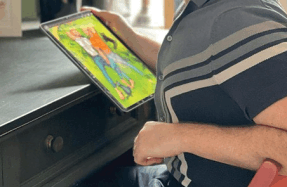SEX IN CITY THE

Honestly, what are we like? Because we’re gay we’re only interested in going out and having sex with multiple partners in sleazy basements and darkrooms — or, in American parlance, backrooms.
Well, actually that’s not strictly true. Most of us prefer to stay home with our partners and watch Netflix. You know, like ‘normal’ people. But for a very long time, a sizeable number of us – the minority that has always fascinated, titillated and enraged self-appointed moralists – has enjoyed indulging our basest desires. Naturally, it’s not only gay men that behave like beasts of the field. But only those who identified as male and gay or bisexual sometimes felt obliged to flout unreasonable laws. Until relatively recently, homosexuality was prohibited virtually throughout the world. No doubt this homophobia goaded us to behave in a more flagrant manner. From the 19th century, we risked arrest in Turkish baths and public toilets and, in even earlier times, places where men “passed water”. There are court records to prove it.
Gay sex clubs have existed, almost invariably in secret, all over the UK and all over the world, for hundreds of years. But our story of the rise of sex clubs in London begins with the Sexual Offences Act in 1967. The new law legalised homosexual acts between two men aged at least 21 — but only in private. In clubs, pubs and bars, men were not even allowed to dance together — let alone have sex. Yet some threw caution to the wind and did both.
It’s possible (no written documentation has been discovered) that at least two London pubs – the Queen’s Head in Chelsea and the King William IV in Hampstead – gained a queer reputation before the Second World War. From the 1950s, common practice in open-minded pubs was to segregate straight and queer customers. This was easy to manage in the days when most pubs still had separate, class-structured bars. Invariably, of course, the queers were relegated to the back bar.
Jeweller Peter Geller remembers visiting Yours or Mine, a disco underneath the Sombrero restaurant in Kensington High Street, in the 1960s. “I think people were still in cottaging mode in those days,” he recalls. “There was sex in the toilets there, but nothing really dirty. Sucking off. I never saw any fucking. Nobody paid much attention to it going on.” The name of the disco reflected gay behaviour at the time: queer venues were used primarily to pick up. Then it was back to yours or mine.

Another notable west London pick-up joint was The Coleherne (latterly a world-famous leather bar) in Earl’s Court, the capital’s first gay village. Retired insurance salesman Simon Parker was here in the late ’60s. “I used to pick people up and take them home,” he confirms. “In those days that was more common.” But there was still misbehaviour around the loos. “I wouldn’t even call it sex,” Parker qualifies. “I would call it fumbling.”
At that time, pubs in England and Wales were required to close at 10.30pm, when men moved on to members-only clubs. The most fondly remembered is the Catacombs, a circular cellar surrounded by recesses, in Earl’s Court. Memories differ, however, as to how much was tolerated there. Actor-director Peter Benedict declares that in the ’70s there was only “friskiness” and this was confined to the recesses. “The only time in my life I’ve ever been thrown out of a bar was when I was 18,” he states. “I went to The Bolton [a gay pub in Earl’s Court] and was picked up by a trawlerman from Harwich. He took me to the Catacombs. I’d never been there before. We had hands down each other’s trousers and the management asked us to leave.”

“THIS GUY SIDLED OVER, UNBUTTONED MY 501S, PUT HIS HANDS INSIDE, WANKED ME AND MADE ME COME IN MY PANTS. IT’S THE MOST EXCITING THING THAT’S EVER HAPPENED TO ME”
Writer Alan Jones, who gravitated to Earl’s Court after he moved to
You’re reading a preview, subscribe to read more.
Start your free 30 days



